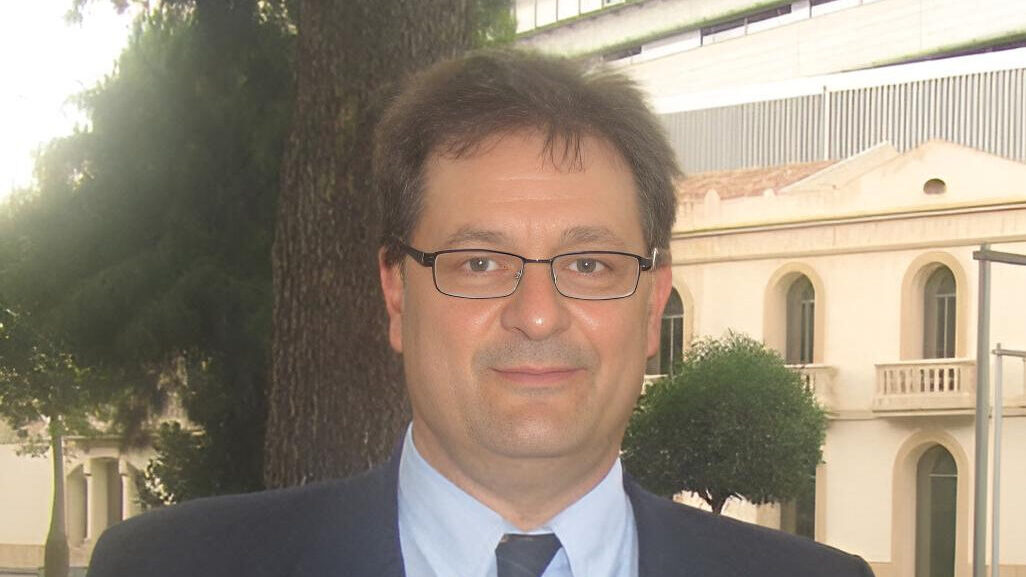Miguel Bronchud, Co-Founder and Advisory Board at Regenerative Medicine Solutions, shared a post on LinkedIn:
“Management of advanced prostate cancers – where honest and competent communication with individual patients and families is paramount to understanding together and correctly deciding upon different treatment options and sequencing, with different consequences on quality of life, financial toxicity, side effects, and chances of longer overall survival?
Title: NCCN Guidelines Insights: Prostate Cancer, Version 3.2024
Authors: Edward M. Schaeffer, Sandy Srinivas, Nabil Adra, Yi An, Rhonda Bitting, Brian Chapin, Heather H. Cheng, Anthony Victor D’Amico, Neil Desai, Tanya Dorff, James A. Eastham, Thomas A. Farrington, Xin Gao, Shilpa Gupta, Thomas Guzzo, Joseph E. Ippolito, R. Jeffrey Karnes, Michael R. Kuettel, Joshua M. Lang, Tamara Lotan, Rana R. McKay, Todd Morgan, Julio M. Pow-Sang, Robert Reiter, Mack Roach III, Tyler Robin, Stan Rosenfeld, Ahmad Shabsigh, Daniel Spratt, Russell Szmulewitz, Benjamin A. Teply, Jonathan Tward, Richard Valicenti, Jessica Karen Wong, Jenna Snedeker, and Deborah A. Freedman-Cass
You can read the Full Article in JNCCN.
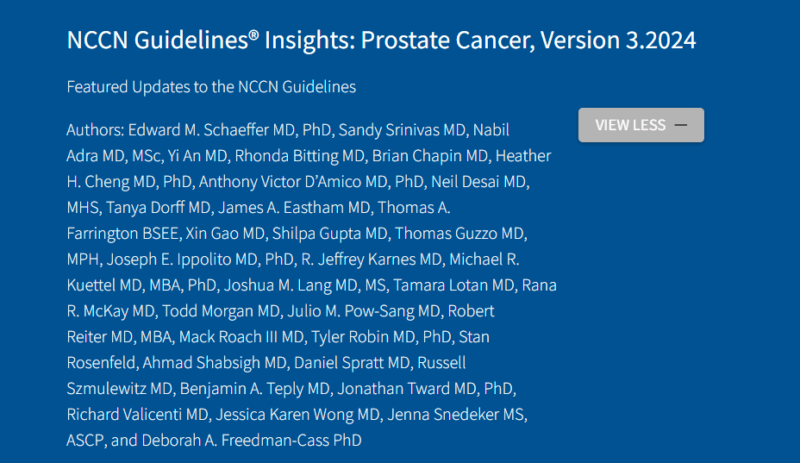
The genomic inter-individual variation and heterogeneity among different individual cancer of prostate cancer patients is higher than for other frequent human cancers and makes curative treatment of advanced disease even more challenging.
Title: Inter- and intra-tumor heterogeneity of metastatic prostate cancer determined by digital spatial gene expression profiling
Authors: Lauren Brady, Michelle Kriner, Ilsa Coleman, Colm Morrissey, Martine Roudier, Lawrence D True, Roman Gulati, Stephen R Plymate, Zoey Zhou, Brian Birditt, Rhonda Meredith, Gary Geiss, Margaret Hoang, Joseph Beechem, Peter S Nelson.
Read the Full Article on Nature Communications.

At first, it caught many of us by surprise to find out that chemotherapy was also useful together with anti testosterone treatments for many prostate cancer patients in advanced stages, ‘Addition of docetaxel, zoledronic acid, or both to first-line long-term hormone therapy in prostate cancer (STAMPEDE): survival results from an adaptive, multiarm, multistage, platform randomised controlled trial’.
Title: Addition of docetaxel, zoledronic acid, or both to first-line long-term hormone therapy in prostate cancer (STAMPEDE): survival results from an adaptive, multiarm, multistage, platform randomised controlled trial
Authors: Nicholas D James, Matthew R Sydes, Noel W Clarke, Malcolm D Mason, David P Dearnaley, Melissa R Spears, Alastair W S Ritchie, Christopher C Parker, J Martin Russell, Gerhardt Attard, Johann de Bono, William Cross, Rob J Jones, George Thalmann, Claire Amos, David Matheson, Robin Millman, Mymoona Alzouebi, Sharon Beesley, Alison J Birtle, Susannah Brock, Richard Cathomas, Prabir Chakraborti, Simon Chowdhury, Audrey Cook, Tony Elliott, Joanna Gale, Stephanie Gibbs, John D Graham, John Hetherington, Robert Hughes, Robert Laing, Fiona McKinna, Duncan B McLaren, Joe M O’Sullivan, Omi Parikh, Clive Peedell, Andrew Protheroe, Angus J Robinson, Narayanan Srihari, Rajaguru Srinivasan, John Staffurth, Santhanam Sundar, Shaun Tolan, David Tsang, John Wagstaff, Mahesh K B Parmar.
Read the Full Article on The Lancet.
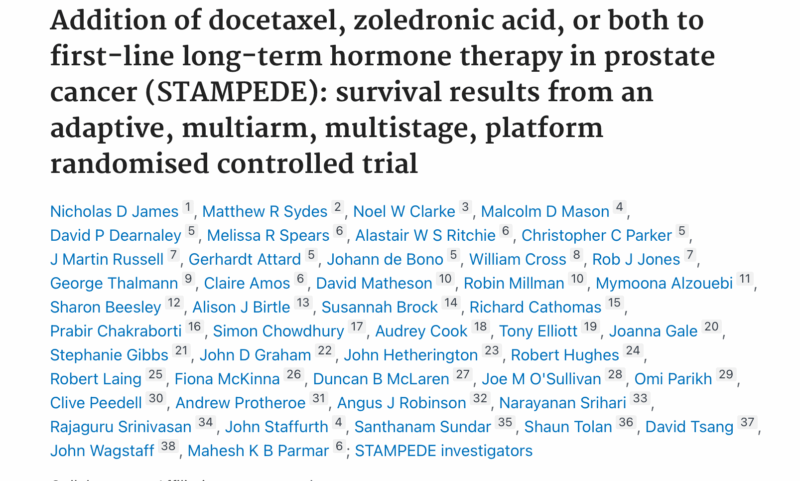
The introduction of docetaxel, androgen receptor pathway inhibitors (ARPIs), poly(ADP-ribose) polymerase inhibitors, and targeted radionuclides has redefined the treatment paradigm, with a focus now on early treatment intensification through combination therapies.
Title: Combination Therapies in Locally Advanced and Metastatic Hormone-sensitive Prostate Cancer
Authors: Arun A Azad, Louise Kostos, Neeraj Agarwal, Gerhardt Attard, Ian D Davis, Tanya Dorff, Silke Gillessen, Chris Parker, Matthew R Smith, Christopher J Sweeney, Bertrand Tombal, and Karim Fizazi
You can read the Full Article in European Urology.
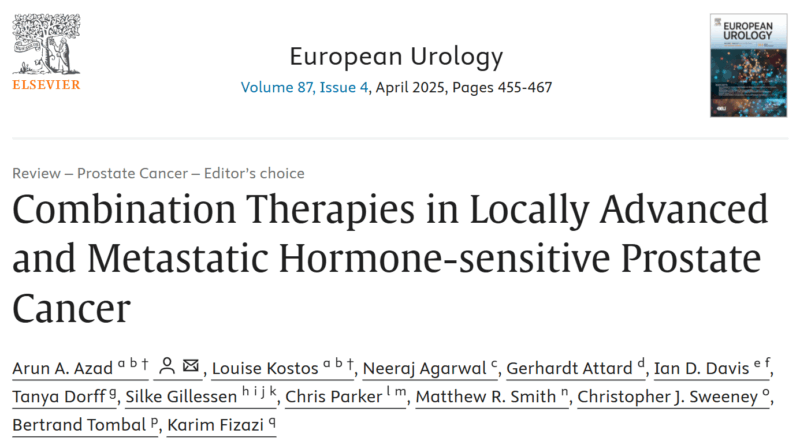
To date it has been impossible to predict the duration of the initial response and remission under ADT and, thus, to adjust treatment plans based on CaP tissue or circulating tumor cell characteristics to maximize such responses. Not surprisingly, among the predictive biomarkers and assays under development, a majority focusses on measuring AR activity and consist of transcriptomics signatures or genomics tools to measure AR’s transcriptional output (e.g., ADT-RS etc).
None have yet transitioned to clinical practice or have been incorporated into clinical guidelines.
Title: Evolving roles for the androgen receptor and its protein interactome in castration-resistant prostate cancer
Authors: Muj Chukhu, Ujjwal R. Dahiya, Hannelore V. Heemers
You can read the Full Article in Oncogene.
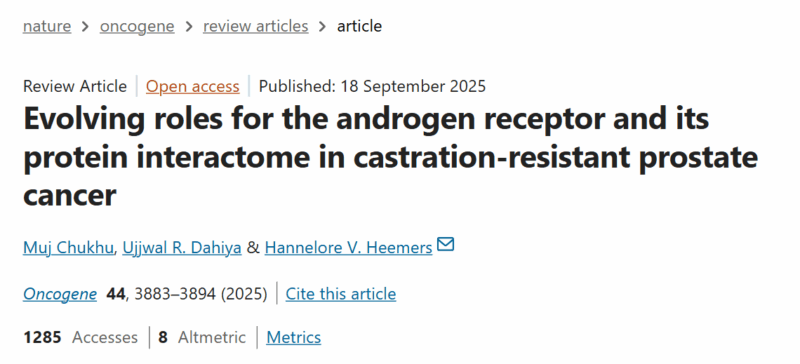
While Teragnostic radionuclides are being developed and used as good palliative treatment for many metastatic prostate cancer patients (especially expressing PSA), the probably most promising knowledge area refers to the epigenetic process of androgen receptors function and resistance to treatment.
Hwang J, Likasitwatanakul P, Deshmukh SK, Wu S, Kwon JJ, Toye E, et al. Structurally oriented classification of FOXA1 alterations identifies prostate cancers with opposing clinical outcomes and distinct molecular and immunologic subtypes.”
Title: Structurally Oriented Classification of FOXA1 Alterations Identifies Prostate Cancers with Opposing Clinical Outcomes and Distinct Molecular and Immunologic Subtypes
Authors: Justin Hwang, Pornlada Likasitwatanakul, Sachin Kumar Deshmukh, Sharon Wu, Jason J. Kwon, Eamon Toye, David Moline, Mark G. Evans, Andrew Elliott, Rachel Passow, Christine Luo, Emily John, Nishant Gandhi, Rana R. McKay, Elisabeth I. Heath, Chadi Nabhan, Natalie Reizine, Jacob J. Orme, Josep M. Domingo Domenech, Oliver Sartor, Sylvan C. Baca, Scott M. Dehm, and Emmanuel S. Antonarakis
You can read the Full Article in Clinical Cancer Research.
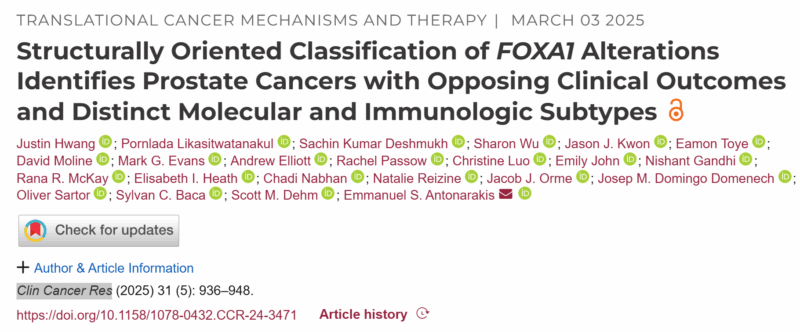
Read more posts featuring Miguel Bronchud on OncoDaily.


